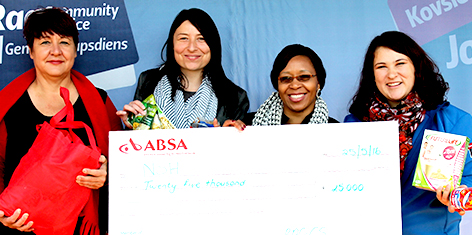Latest News Archive
Please select Category, Year, and then Month to display items
12 January 2024
|
Story Nonsindiswe Qwabe
|
Photo Sonia Small
 Since joining the UFS in 2008, Dr Grey Magaiza has worked extensively on approaches that can foster the socio-economic transformation of societies.
Since joining the UFS in 2008, Dr Grey Magaiza has worked extensively on approaches that can foster the socio-economic transformation of societies.
“The future should be one where communities can decide on their development agenda and futures. That’s the most important for me.” Dr Grey Magaiza, Deputy Director of the Centre for Gender and Africa Studies (CGAS) and Head of the Community Development programme on the Qwaqwa Campus, is passionate about capacitating communities to be agents of change and advancement. His vision for the future emphasises the empowerment of communities to take charge of their development by actively participating in decision making and the implementation of development projects that can improve their lives.
Since joining the UFS in 2008, Dr Magaiza has worked extensively on approaches that can foster the socio-economic transformation of societies. Over the years, he has crafted his research speciality into one that he is most proud of – being an interdisciplinary scientist immersed in the development of communities.
“I’m in a fortunate position of researching what I like. I say ‘fortunate’, because I’ve taken the time to understand what I’m passionate about, which is the overall field of rural livelihoods and livelihood futures – in short, community development. My research starts from an engaged university, understanding the elements that a university must use to enhance transformation and relevance to its immediate community in terms of development.”
One of the ways he has done this is by looking at social entrepreneurship as a development approach for young people in a rural setting. Through workshops with non-profit and civic organisations in Qwaqwa, Dr Magaiza has been helping these organisations to map out their needs and actively meet them through the involvement and support of external role players.
“We understand that communities are part of the national development agenda, but even that national agenda respects community knowledge and intentions and allows communities to shape their identity. A critical enabler of this is community organising. You bring back the capacity in communities to have dialogues on issues affecting them as spaces for engagement, knowledge exchange, and for people to just talk about their way forward.”
By enabling communities to define their development agenda, they can address their specific needs, challenges, and aspirations, he said. “When I look at livelihood futures, it’s quite an exciting aspect of my work – it’s like looking into a fortune tellers’ globe, because you’re not deciding for communities what they should do, but the communities themselves take those decisions.”
UFS community makes difference through Big Give Project
2016-06-10
 Food for the needy. From left is Annelize Visagie, Health and Wellness;
Food for the needy. From left is Annelize Visagie, Health and Wellness;
Vicky Simpson, No Student Hungry Food Bursary Programme;
Elizabeth Msadu, Health and Wellness; and Lorinda Slippers, Student
Representative Council Rag Community Service, at the handover of
the food and cash collected by the RAG Big Give Project. Photo: Jóhann Thormählen
Thanks to the caring community of the University of the Free State (UFS), students in need were provided for during exams, and will receive more food in the cold winter months.
Once again, staff and students made valuable contributions at the successful RAG Big Give Project, where food contributions of R 38 176.20 and cash donations of R25 000 were received. Staff, residences, and the RAG Committee made these donations as part of the project on 5 May 2016, when contributions were made at the Bloemfontein Campus gates of the UFS. An extra donation by Imperium, a residence on the Bloemfontein Campus, of R20 000 for FutureLife helped to achieve the grand total of food contributions.
According to Vicky Simpson, Assistant Officer at the No Student Hungry Food Bursary Programme (NSH), the food donation is for a designated group of students who have already been identified as food insecure by the social work office. “It will be distributed to them on a monthly basis,” she said.
The handover of food collected was done on 25 May 2016 at the RAG Food store by the RAG Office to Health and Wellness and the NSH. The RAG Office thanked the UFS community for its contributions to the project. Parexel, who made cash and food donations, received special mention. Simpson said “the food will make a huge difference in the lives of students who do not know where their next meal will come from”.
According to Jaco Faul, Senior Assistant Officer Rag CS, his office is already looking forward to the next instalment of the Big Give Project. “We challenge faculties and staff members for the forthcoming Rag Big Give project in October to see if we can beat the amount collected this time.”